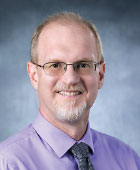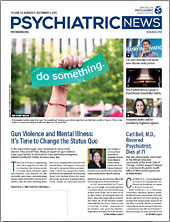Physicians are frequently challenged to “practice to the top of their license.” What does that mean for modern psychiatrists?
David Mintz, M.D., who leads the APA Psychotherapy Caucus, argues that for psychiatrists, practicing at the top of their license requires that they integrate their provision of psychotherapy and psychopharmacology to improve patient outcomes. The comprehensive training that psychiatrists receive in both areas sets them apart from primary care providers, psychiatric nurse practitioners, and psychiatric physician assistants. Prescribing psychologists may have received training in both disciplines but not at the level of training that psychiatrists received during residency.
Truly practicing at the top of one’s psychiatric license, however, should also involve incorporating a knowledge of neuroscience and comorbid conditions when treating patients. The Accreditation Council for Graduate Medical Education (ACGME) requires that by the time of graduation, psychiatry residents must be able to explain “neurobiological hypotheses and genetic risks of common psychiatric disorders to patients” (ACGME Medical Knowledge 3—Clinical Neuroscience) and demonstrate “sufficient knowledge to systematically screen for, evaluate, and diagnose common medical conditions in psychiatric patients and to ensure appropriate further evaluation and treatment of these conditions in collaboration with other medical providers” (ACGME Medical Knowledge 2—Psychopathology). The ability to combine these disparate arenas with a knowledge of psychopathology into a comprehensive assessment and to provide psychopharmacological and psychotherapeutic interventions in a unified treatment plan represents the pinnacle of the psychiatric profession.
Maintaining familiarity with the field’s evolving understanding of neuroscience requires psychiatrists to not only understand brain anatomy and genetic risk factors but also the role of epigenetic modification (how life experiences might alter the expression of genes). The term “biopsychosocial” had previously been used as shorthand to indicate that clinicians should consider all aspects of a patient’s life. We now understand that epigenetic modification is the vehicle by which the psychological and social realms of life directly impact biology. Experiences, both positive and negative, alter brain functioning on a cellular level. This helps explain to clinicians and patients the impact that psychotherapy has on neurobiology. Additionally, our increasing understanding of the inflammatory and immunological systems and their interactions with mental and physical health requires the cutting-edge psychiatrist to consider all aspects of a patient’s health.
The rapid expansion of psychopharmacology over the last 20 years has increased both the tools available to treat mental illness and an awareness of the limitations of these tools. While a vast number of patients respond to medications, even the most enthusiastic psychopharmacologist must acknowledge the frequent failure of psychotropic medications to lead to sustained remission. This has forced clinicians to be ever more creative in the use of complex medication regimens and to consider newer technological interventions such as transcranial magnetic stimulation in treatment planning.
Acknowledging these limitations, psychiatrists should continue to rely on the proven efficacy of talking with patients. Psychiatrists should know more about the extensive literature supporting the effectiveness of psychosocial interventions and be prepared to provide psychotherapy.
The empathic, hopeful interaction between patient and physician has always been a major component in easing suffering. Helping individuals change how they look at themselves and the world around them inevitably aids those in distress. For this reason, all psychiatry residency training programs must ensure that graduates are competent in short-term and long-term psychodynamic psychotherapy, cognitive-behavioral therapy, and supportive psychotherapy. This knowledge and a readiness to employ those techniques are what characterize the field of psychiatry.
Practicing to the top of our license as a modern psychiatrist entails incorporating knowledge of and experience with practical neuroscience, comorbid medical conditions, psychopharmacology, and psychotherapy. Our patients will ultimately benefit from this comprehensive understanding and treatment approach. ■

